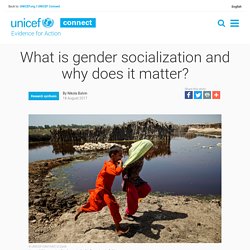

Knowledge gained from the observations, modeling and imitations of people close to them can affect and influence the children's gender development.
These people can be made up of parents, teachers in school, religious leaders, peers, playmates in the socio-cultural environment that the children interacts often with. Because the family unit is often the closest group of people and involves continuous interactions with the child, the behaviours of the parents often impact the children the most (Martin et al., 2004). These are especially critical during the early formative learnings stages.
As children gets older, they can also be influenced by religion and media, such as the portrayal of favourite characters in movies, TV cartoons, and games.
How Albert Bandura's Social Learning Theory Works. Learning is a remarkably complex process that is influenced by a wide variety of factors. As most parents are probably very much aware, observation can play a critical role in determining how and what children learn.1 As the saying goes, kids are very much like sponges, soaking up the experiences they have each and every day.
Because learning is so complex, there are many different psychological theories to explain how and why people learn. A psychologist named Albert Bandura proposed a social learning theory which suggests that observation and modeling play a primary role in this process.2. Untitled.
People such as the child's family, childcare teachers, extended families and friends can often influence a child's gender identity. – shloh010
Untitled. Untitled. Untitled. Untitled. What is gender socialization and why does it matter? - Evidence for Action. Even if you are not familiar with the concept of “gender socialization”, it is most likely that you have been influenced by it and in turn passed on your own beliefs about what constitutes gender-appropriate attitudes and behaviour to others.

Gender socialization begins at birth, intensifies during adolescence and contributes to gender inequalities in education, employment, income, empowerment, and other significant outcomes of well-being during adolescence and later in life, argues a recently published discussion paper by the UNICEF Office of Research – Innocenti and the International Centre for Research on Women.
[A new research brief summarizes the key insights and conclusions from the discussion paper on gender socialization during adolescence] Before exploring the framework developed in the paper and its application to programming and policy-making, let us reflect on what gender socialization is and how it manifests in everyday life. Untitled. 4 Principles of social learning. Early learning and differential treatment of toddlers from adults.